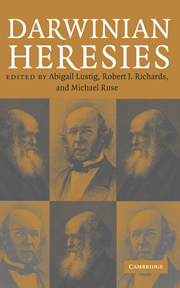Book contents
- Frontmatter
- Contents
- List of Contributors
- 1 Introduction: Biologists on Crusade
- 2 Russian Theoretical Biology between Heresy and Orthodoxy: Georgii Shaposhnikov and His Experiments on Plant Lice
- 3 The Specter of Darwinism: The Popular Image of Darwinism in Early Twentieth-Century Britain
- 4 Natural Atheology
- 5 Ironic Heresy: How Young-Earth Creationists Came to Embrace Rapid Microevolution by Means of Natural Selection
- 6 If This Be Heresy: Haeckel's Conversion to Darwinism
- 7 Adaptive Landscapes and Dynamic Equilibrium: The Spencerian Contribution to Twentieth-Century American Evolutionary Biology
- 8 “The Ninth Mortal Sin”: The Lamarckism of W. M. Wheeler
- 9 Contemporary Darwinism and Religion
- Index
1 - Introduction: Biologists on Crusade
Published online by Cambridge University Press: 11 July 2009
- Frontmatter
- Contents
- List of Contributors
- 1 Introduction: Biologists on Crusade
- 2 Russian Theoretical Biology between Heresy and Orthodoxy: Georgii Shaposhnikov and His Experiments on Plant Lice
- 3 The Specter of Darwinism: The Popular Image of Darwinism in Early Twentieth-Century Britain
- 4 Natural Atheology
- 5 Ironic Heresy: How Young-Earth Creationists Came to Embrace Rapid Microevolution by Means of Natural Selection
- 6 If This Be Heresy: Haeckel's Conversion to Darwinism
- 7 Adaptive Landscapes and Dynamic Equilibrium: The Spencerian Contribution to Twentieth-Century American Evolutionary Biology
- 8 “The Ninth Mortal Sin”: The Lamarckism of W. M. Wheeler
- 9 Contemporary Darwinism and Religion
- Index
Summary
The intellectual landscape of Darwinism for the last 150 years bears a certain resemblance to Germany during the Thirty Years' War. Sects and churches, preachers and dissenters, holy warriors and theocrats vie with each other for the hearts of the faithful and the minds of the unconverted, all too often leaving scorched earth behind.
Such an extravagant metaphor is not much of an overstatement. Accusations of heresy – and equally shameful, imputations of orthodoxy – have been thrown around in the history of evolutionary biology, from within and outside the community of scientists, with reckless abandon. Nor are these terms metaphorical: they are the ones that biologists have used themselves in defense of friends and denigration of foes. Antagonists on all sides of debates about evolutionary biology have wielded the language of holy warriors, declaring crusades to expunge heretics from the domains of biological science. Locutions such as these have become organizing tropes for biologists since the time of Darwin. Yet this aspect of the history of evolutionary theory has – rather surprisingly, in light of the inordinate attention given to evolution's entanglements with religion – usually been ignored.
Why is evolutionary biology so rife with the terms and emotions of organized Western religion? Numerous factors have played a role.
- Type
- Chapter
- Information
- Darwinian Heresies , pp. 1 - 13Publisher: Cambridge University PressPrint publication year: 2004
- 3
- Cited by



